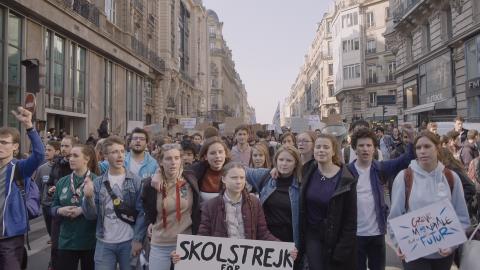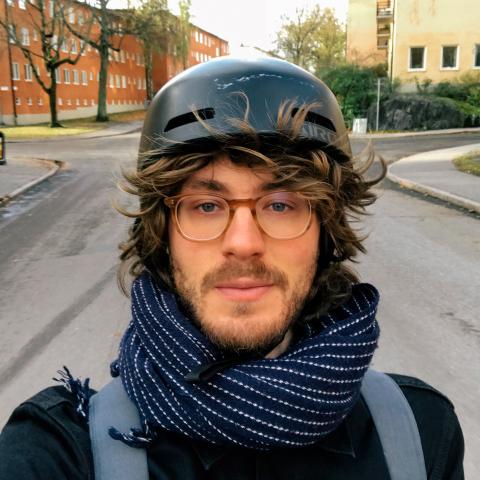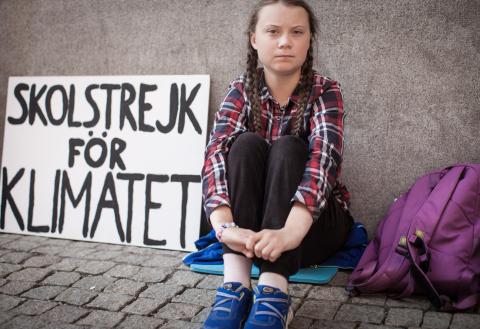
I Am Greta director Nathan Grossman could never have known that the pigtailed teenager he chose to film when she sat by the wall of the Swedish parliament in Stockholm that August of 2018, holding a sign that read Skolstrejk för Klimatet (School Strike for Climate), would turn into an influential star, known simply by her first name, inspiring a global movement of young activists the likes of which had not been seen since the 60s.
“Adults say one thing and do something completely different all the time,” said the then-15-year-old, whose laser-focus has been attributed to her Asperger syndrome (she’s called it a “superpower”). “We have one planet and we should take care of it and yet no one gives a damn about climate change.” Boy, was she wrong. Her school strike for climate change, also known as Fridays For Future, brought out millions of people in 150 countries.
Greta Thunberg went on to meet with politicians, speak at assemblies and conferences, and show that one person can make a difference, while enduring name calling and even death threats. She walks the walk, talks the talk, living a strict vegan lifestyle, keeping her carbon footprint to a minimum, opting not to fly. The film begins with a shot of her dangerous 15-day trip by sailboat in August 2019, on the Atlantic Ocean to New York City, in order to speak at the UN Climate Change Summit.
The doc opens tomorrow (Oct. 16) in theatres across Canada and will be available on Crave and other on-demand services, as of Nov. 13.
Samaritanmag talked to Grossman via Zoom about the unexpected unfolding of one of the world’s most important teen voices.

Yes, I had no idea that I was going to spend a year that crazy.
How did you get involved so very early, with her first protest, sitting against the wall with her backpack and a sign?
Like many documentary projects, it started with a tip. I got a tip from a friend who knew her family a bit that she was going to do some small school strike outside the Swedish government. It was August, 2018, and the Swedish election was coming up and she wanted to do something for that. So I talked to my boss and we discussed if it was worth giving one or two days to go down there and see if there was any interest. And we decided to try it. So I took the camera and the sound technician that's a friend of mine and went down to see what this was.
That's pretty unusual for an adult to not dismiss one kid staging a protest and to think there is a story there.
We had a very warm summer in Sweden with lots of forest fires so the topic was high on the agenda. And I'm personally interested in the question of climate change. I've done movies, not exactly about it, but that relates to it a little bit. So it was something that I felt for. But also as documentary filmmakers and as journalists, it’s a classic thing; I have hard drives full of projects that don't end up becoming anything. It’s just this thing of having to try, to just see where things go.
You just mentioned that you were interested in climate change. To what degree? Greta is vegan. She chose to sail to America because it’s environmentally friendly. How strict were you in terms of personal actions?
I would say I was a concerned citizen. I knew a lot about it. I did a public broadcasting show that looked at the meat consumption in Sweden. It was biased in that way. We looked at it and came to scientific conclusions. So I was interested, but I learned much more about it, then also got a little bit more worried about climate change by spending that year with Greta.
And what was your view about teenagers and what they can and cannot accomplish?
I’ve always had the view that that young people should be listened to. Maybe it's a little bit of a Swedish thing. We have a criticism we listen too much to young people and too little to the old, but I was interested in hearing the opinion of someone who was young and will be very influenced by climate change, because, of course ,the younger you are, the more you're going to feel the effects of climate change.
Did you care about social issues or politics when you were a teenager?
No, I was fairly nerdy actually. I was mostly interested in video games and stuff like that. I didn't have any kind of political interest when I was that age.

We should listen to her children, especially when it comes to climate change. Many young people, especially in Sweden, have shown that they have great interest in this issue, and that people that are younger care about this more than people that are older, probably because they will be more effected. So I think that we should listen to our children.
When it comes to Gretta, it's so interesting that she was the one who got the family interested in this topic. They were a very high-consuming family, classic upper middleclass Swedish family who flew around the world. Her mother is an opera singer. They live the nice life. So it was Greta, that really when she got interested in this topic, convinced them to change their lives.
You were along for the ride, documenting it. What changed in you, how she influenced you in your daily life?
I think more consciously of what I do. I also spend more time reading up on the issue when new reports are coming. Before I was a concerned citizen so I would read the news, but I wouldn't go to the sources and I wouldn't look in these reports so much. Now, after meeting Greta, she's convinced me how important it is to read up on the issue, and not only read the short versions, but also go into the facts and figures and seeing how these calculations are done because this is really a matter for my future. So, so that's one thing that I've definitely been influenced by her about
Greta mentioned in the that when she was a kid in school, she had seen a film — she didn’t mention its name — I assume about us destroying the planet and that kicked off her interest in climate change. For your film, are you going to have a shorter version for educational purposes, with teachers manuals so it can be shown in classrooms?
Yeah. I think it's a little bit different in different territories, but I know that there will be lots of a work put in to helping schools and community screening to watch the film. I I don't know the detailing about how it looks in Canada, but that is definitely the plan. I think that the film has potential of helping people to understand both the climate issue, but, of course ,also what it means to being a young activist and what, how, why and how activism is important. So that's a really good thing.
I don't know exactly what movie Greta watched. It's a really good question. It struck me now that I've never asked her about that and never did when I did the interviews and she told me, but it's interesting because just as she got interested in climate change by watching a film, that was also how I got interested in climate change. I watched this documentary that I think many of us watched, An Inconvenient Truth by Al Gore [2006], when I was a little bit older than Gretta. I remember it as a very strong experience actually, and maybe a very small kind of starting point for me getting interested in that topic as well. I don't have like daily contact with her in that sense anymore, as we're not filming, but I will keep it in my back of my head.
Greta says towards the very, very end of the film then if you deal with crisis in time, the problems won't be as big. That can be applied, of course, to how governments have handled covid-19. Have you talked to her since the pandemic and how she's doing or how she's even still tackling the issue of climate change when there's another issue at the forefront?
Of course, we don't have the same contact now as we did when filming, but sometimes we chat a little bit. She took one sabbatical year and now, this fall, he started to go back to high school. So it was good timing, in the sense that she wanted to focus on school. But, of course the pandemic — and here in Sweden where we haven't had that much restrictions — of course changed the way that we do everything — and also how we do activism. I know that the school strike for the climate movement, of key importance was listening to the scientists. [With the pandemic], they were very quick to shut down protests and making sure that they were not spreading the disease, which was very good. But, of course, continuing to plan their activism, and when the virus comes down and when they find new ways of continuing activism, I bet that they will do that.
One alarming statistic — that if people don't watch the closing credits will miss — is that more than 200 climate activists were murdered in 2018. We need a documentary on that. We did see in your film how nasty people were to Greta and that she got death threats, but that’s an incredible number.
That’s what's so hard with this topic. You have 90 minutes to do filming and everyone wants to see so much and wants to know everything, but you need to have a specific point of view. My interest was definitely to get inside the mind of Gretta and to understand her and give a more three-dimensional view of her. But I definitely hope that someone is, or that someone will, make a documentary about these fantastic activists that are fighting all over the globe and also risking their lives in a way, which can be very dangerous.
You were a fly on the wall, but in close confines to Greta. Did you sense the danger or potential danger? We saw the name-calling by some adults, who also brought in Asperger's as a way to diminish her.
I don't know exactly what kind of threats that she got in detail. I'm a documentary filmmaker and I followed her a lot, but not every day. During a specific period of time I would traveling with her. I could feel that. It was a bit vulnerable in the sense that all these politicians, they travel on their private jet, and they were very hard to reach, and Greta is very grassroots, wants to be with the people and wants to do things in a way which doesn't make carbon. I also think that many of these comments and much of this hatred is so much a product of the polarized internet world that we live in, where people also tend to just write lots of things, but do that from home.
You're obviously doing interviews with people that admire Greta or are staunchly involved with climate change activism themselves. Have you done any interviews with climate change deniers that just think your doc is propaganda?
Yeah, I've done probably well over a hundred interviews. I've done interviews with all kinds of different journalists from publications, who think different things about her. What's interesting is that sometimes people who really attack her seemed just to be interested in doing that, and not being interested in any way in discussing what's in these reports and what this peer-reviewed science says. And I, of course, understand that it can be a frustrating issue and it would be a nice thing if we could just get rid of climate change, but, sadly, we won't get rid of it by denying it.
Did any of these people say, ”I watched your film and did a 180”?
No, no. I've just spoken to journalists. I don't know if that has happened, but and that was never the goal of convincing people that don't believe in human-made climate change. They need to be convinced by something else. And it sounds that we already have peer-reviewed science, and if you don't believe in that, it's like not believing in the laws of physics, in a sense.
She’s a pretty incredible human being that's for sure.
I'm interested where you were most emotional, you said, when you watched the film.
Maybe I'm like being cooped up too long, but probably six to right times throughout, from right at the beginning when the lady stopped and told her to go to school, waving her off; when her mom was emotional; when thousands came out for the strikes, when she was getting death threats, when Conservative commentator Michael Knowles called her a mentally ill child, when she was risking her life on the boat…
Yeah, that's also interesting in a sense because it’s a human interest story as well. Of course, it talks about the climate crisis and how young people feel about that and Gretta specific, but it's also a human interest story about coming of age and about taking on this big journey.
(Please support Samaritanmag's original journalism by making a PayPal contribution or EMT transfer using info@samaritanmag.com so we can increase the amount of content and writers we hire. Samaritanmag is the anti-tabloid, covering good people trying to change bad things. Let's make this thing bigger than TMZ.)
Nike